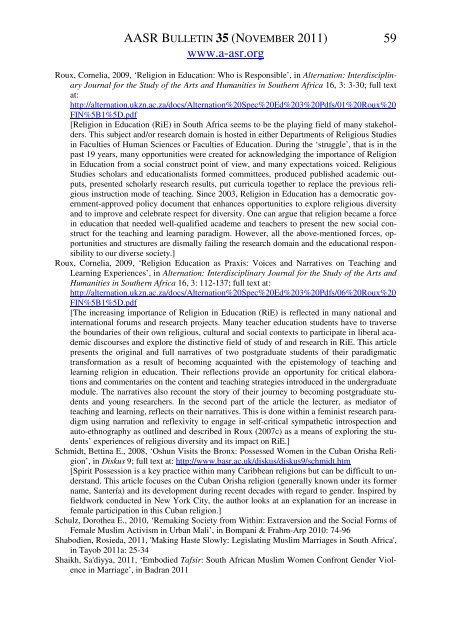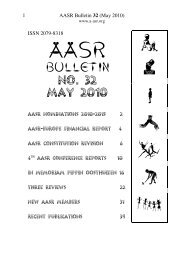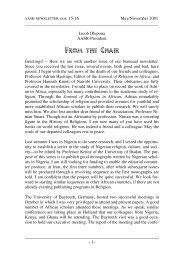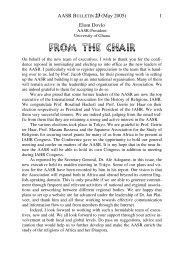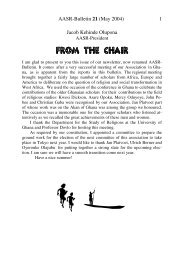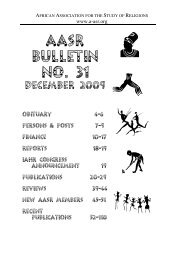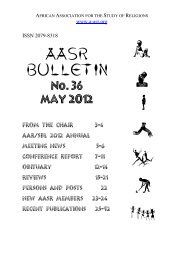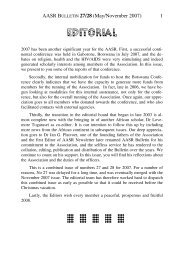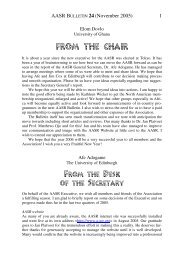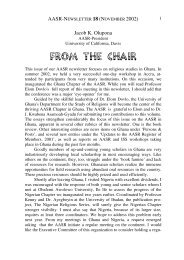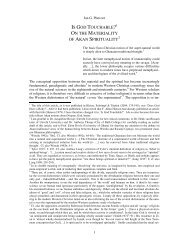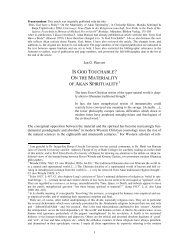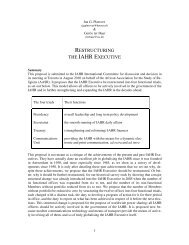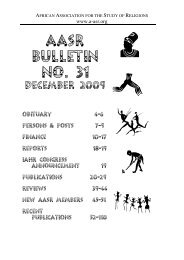AASR Bulletin 35 - The African Association for the Study of Religions
AASR Bulletin 35 - The African Association for the Study of Religions
AASR Bulletin 35 - The African Association for the Study of Religions
You also want an ePaper? Increase the reach of your titles
YUMPU automatically turns print PDFs into web optimized ePapers that Google loves.
<strong>AASR</strong> BULLETIN <strong>35</strong> (NOVEMBER 2011)<br />
www.a-asr.org<br />
59<br />
Roux, Cornelia, 2009, ‘Religion in Education: Who is Responsible’, in Alternation: Interdisciplinary<br />
Journal <strong>for</strong> <strong>the</strong> <strong>Study</strong> <strong>of</strong> <strong>the</strong> Arts and Humanities in Sou<strong>the</strong>rn Africa 16, 3: 3-30; full text<br />
at:<br />
http://alternation.ukzn.ac.za/docs/Alternation%20Spec%20Ed%203%20Pdfs/01%20Roux%20<br />
FIN%5B1%5D.pdf<br />
[Religion in Education (RiE) in South Africa seems to be <strong>the</strong> playing field <strong>of</strong> many stakeholders.<br />
This subject and/or research domain is hosted in ei<strong>the</strong>r Departments <strong>of</strong> Religious Studies<br />
in Faculties <strong>of</strong> Human Sciences or Faculties <strong>of</strong> Education. During <strong>the</strong> ‘struggle’, that is in <strong>the</strong><br />
past 19 years, many opportunities were created <strong>for</strong> acknowledging <strong>the</strong> importance <strong>of</strong> Religion<br />
in Education from a social construct point <strong>of</strong> view, and many expectations voiced. Religious<br />
Studies scholars and educationalists <strong>for</strong>med committees, produced published academic outputs,<br />
presented scholarly research results, put curricula toge<strong>the</strong>r to replace <strong>the</strong> previous religious<br />
instruction mode <strong>of</strong> teaching. Since 2003, Religion in Education has a democratic government-approved<br />
policy document that enhances opportunities to explore religious diversity<br />
and to improve and celebrate respect <strong>for</strong> diversity. One can argue that religion became a <strong>for</strong>ce<br />
in education that needed well-qualified academe and teachers to present <strong>the</strong> new social construct<br />
<strong>for</strong> <strong>the</strong> teaching and learning paradigm. However, all <strong>the</strong> above-mentioned <strong>for</strong>ces, opportunities<br />
and structures are dismally failing <strong>the</strong> research domain and <strong>the</strong> educational responsibility<br />
to our diverse society.]<br />
Roux, Cornelia, 2009, ‘Religion Education as Praxis: Voices and Narratives on Teaching and<br />
Learning Experiences’, in Alternation: Interdisciplinary Journal <strong>for</strong> <strong>the</strong> <strong>Study</strong> <strong>of</strong> <strong>the</strong> Arts and<br />
Humanities in Sou<strong>the</strong>rn Africa 16, 3: 112-137; full text at:<br />
http://alternation.ukzn.ac.za/docs/Alternation%20Spec%20Ed%203%20Pdfs/06%20Roux%20<br />
FIN%5B1%5D.pdf<br />
[<strong>The</strong> increasing importance <strong>of</strong> Religion in Education (RiE) is reflected in many national and<br />
international <strong>for</strong>ums and research projects. Many teacher education students have to traverse<br />
<strong>the</strong> boundaries <strong>of</strong> <strong>the</strong>ir own religious, cultural and social contexts to participate in liberal academic<br />
discourses and explore <strong>the</strong> distinctive field <strong>of</strong> study <strong>of</strong> and research in RiE. This article<br />
presents <strong>the</strong> original and full narratives <strong>of</strong> two postgraduate students <strong>of</strong> <strong>the</strong>ir paradigmatic<br />
trans<strong>for</strong>mation as a result <strong>of</strong> becoming acquainted with <strong>the</strong> epistemology <strong>of</strong> teaching and<br />
learning religion in education. <strong>The</strong>ir reflections provide an opportunity <strong>for</strong> critical elaborations<br />
and commentaries on <strong>the</strong> content and teaching strategies introduced in <strong>the</strong> undergraduate<br />
module. <strong>The</strong> narratives also recount <strong>the</strong> story <strong>of</strong> <strong>the</strong>ir journey to becoming postgraduate students<br />
and young researchers. In <strong>the</strong> second part <strong>of</strong> <strong>the</strong> article <strong>the</strong> lecturer, as mediator <strong>of</strong><br />
teaching and learning, reflects on <strong>the</strong>ir narratives. This is done within a feminist research paradigm<br />
using narration and reflexivity to engage in self-critical sympa<strong>the</strong>tic introspection and<br />
auto-ethnography as outlined and described in Roux (2007c) as a means <strong>of</strong> exploring <strong>the</strong> students’<br />
experiences <strong>of</strong> religious diversity and its impact on RiE.]<br />
Schmidt, Bettina E., 2008, ‘Oshun Visits <strong>the</strong> Bronx: Possessed Women in <strong>the</strong> Cuban Orisha Religion’,<br />
in Diskus 9; full text at: http://www.basr.ac.uk/diskus/diskus9/schmidt.htm<br />
[Spirit Possession is a key practice within many Caribbean religions but can be difficult to understand.<br />
This article focuses on <strong>the</strong> Cuban Orisha religion (generally known under its <strong>for</strong>mer<br />
name, Santería) and its development during recent decades with regard to gender. Inspired by<br />
fieldwork conducted in New York City, <strong>the</strong> author looks at an explanation <strong>for</strong> an increase in<br />
female participation in this Cuban religion.]<br />
Schulz, Doro<strong>the</strong>a E., 2010, ‘Remaking Society from Within: Extraversion and <strong>the</strong> Social Forms <strong>of</strong><br />
Female Muslim Activism in Urban Mali’, in Bompani & Frahm-Arp 2010: 74-96<br />
Shabodien, Rosieda, 2011, 'Making Haste Slowly: Legislating Muslim Marriages in South Africa',<br />
in Tayob 2011a: 25-34<br />
Shaikh, Sa'diyya, 2011, ‘Embodied Tafsir: South <strong>African</strong> Muslim Women Confront Gender Violence<br />
in Marriage’, in Badran 2011


